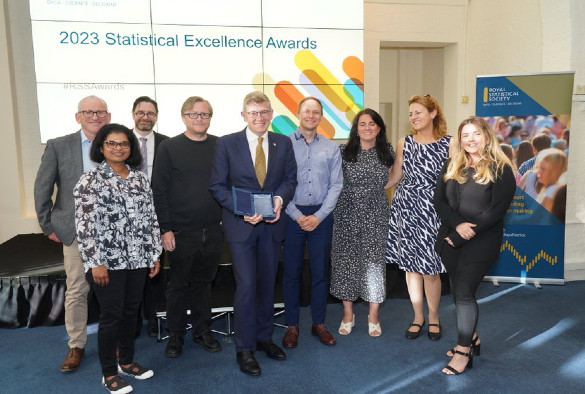
The analysts behind the mass Covid-19 testing pilot in Liverpool have been awarded the 2023 Florence Nightingale Award for Excellence in Healthcare Data Analytics.
The annual award, named after the Society’s first female fellow and pioneer of data visualisation, Florence Nightingale, celebrates data analysts in the UK health and care sector whose work has delivered better outcomes for patients.
Now in its fourth year, the award is supported by the Health Foundation, an independent charitable organisation working to build a healthier UK.
The Liverpool COVID SMART mass testing evaluation and CIPHA analytic legacy – led by the University of Liverpool in partnership with NHS Cheshire & Merseyside, Liverpool City Region Combined Authority (Civic Data Cooperative), Liverpool City Council, and Mersey Care NHS Foundation Trust.
This project is a culmination of three years of work by a team across Liverpool’s academic, public health and NHS partners. With the creation of the UK’s first Civic Data Cooperative for public and practitioner involvement in health data analysis, the team established the system that enabled Liverpool to offer the world’s first large scale testing pilot for voluntary use of lateral flow tests. The data gathered from this was delivered to SAGE within six weeks of the start of the pilot, informing both UK and international pandemic policy.
The judging panel was impressed with the huge amount of work done to engage meaningfully and proactively with different organisations and the wider public. A real commitment was demonstrated to openness with the publication of the code and resources, including information governance documentation. The impact was outstanding, with a reduction in Covid hospitalisations reduced by at least a quarter during the pilot.
Professor Iain Buchan, Associate Pro Vice Chancellor for Innovation, Chair in Public Health and Clinical Informatics, and Chief Investigator for the programme of work said: “I am so proud of the brilliant teamwork across the Liverpool City Region and NHS Cheshire and Merseyside civic family of data analysts. Through COVID-19 and beyond, we have collaborated so closely it is difficult to tell who works for the University, NHS or one of our local authorities. This closeness has improved both scientific and societal impacts. A lot of trust and mutual respect was built through meeting the extreme challenges of standing up a new integrated health intelligence system for 2.7m people and using it to deliver world-first responses to the COVID-19 pandemic. This partnership has now become core business for our academic health system, and we are investing further in people and infrastructure to deliver high quality, timely intelligence, close-coupled across science and service.”
Charles Tallack, director of data analytics at the Health Foundation, commenting on this year’s winners, said: “The effective use of data and analytics is crucial to the recovery of the health and care system. These two winning projects are excellent examples of ambitious collaborations that improved health and care by harnessing data in innovative ways. Each team meaningfully involved and engaged patients and the public in their work, and published a wealth of information and resources in easily accessible forms. These impactful pieces of work are brilliant examples of how data analysts are tackling real world problems and benefiting patients. Congratulations to both teams.”
The RSS and Health Foundation are grateful to the judging panel (Nessa Becerra, Geraint Day, Karen Facey and Natalie Creary) for their involvement in this year’s award.
The Liverpool researchers are joint winners of the award, alongside a project looking into the impact of long Covid in Scotland.